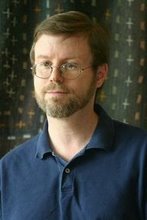Francisco Goldman is another author whom I checked out after seeing him at PEN. The Art of Political Murder is a nonfiction account of the murder of Bishop Gerardi in Guatemala City in 1998. Goldman reported the case on spec for The New Yorker, returning to Guatemala repeatedly over a number of years.
Gerardi was beaten to death on the grounds of the parish house of the church of San Sebastian (which was Goldman’s own church as a child). The killing came shortly after Gerardi released a massive report holding the former military regime responsible for the vast majority of the deaths of 200,000 Guatemalans in the country’s civil war.
The motive and the culprits might seem obvious, but complications quickly arose. Why should the bishop be killed after the report appeared and not before? Wouldn’t military killers have done the job more cleanly? And what about the strange behavior of Father Mario?
Goldman tells a complicated story in clean journalistic prose, though fairly close attention is needed to keep the movements and identities of the characters straight. (Helpful maps and lists are provided.) Though the killing and disappearance of witnesses are a recurring theme, Goldman doesn’t dwell much on the danger he is running himself. One exception comes when he receives a frightening phone call from the powerful Colonel Lima, one of the main suspects in the killing. The call is even more unsettling because static makes most of it undecipherable.
Knowing that I’d put myself on Colonel Lima’s radar make me uneasy, although I didn’t really think that anything was going to happen to me, an American citizen.... But when I came home at night I was frightened by the darkness of my room at the Spring, whose only window opened onto a small patio, and I worried about the flimsy lock on the door. Stuck in traffic on gray afternoons in late September, I’d feel overwhelmed by a very particular sadness, something that seemed to come from the unconscious memory of the street itself, of all the people who were driving or just walking to or from someplace — an office, a church, the movies, school — and must have had a last moment of panic or grief or resignation, realizing that there was no escape and that they would never get home.




No comments:
Post a Comment